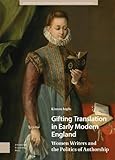Gifting Translation in Early Modern England : Women Writers and the Politics of Authorship / Kirsten Inglis.
Material type: TextSeries: Gendering the Late Medieval and Early Modern World ; 21Publisher: Amsterdam : Amsterdam University Press, [2023]Copyright date: ©2023Description: 1 online resource (216 p.)Content type:
TextSeries: Gendering the Late Medieval and Early Modern World ; 21Publisher: Amsterdam : Amsterdam University Press, [2023]Copyright date: ©2023Description: 1 online resource (216 p.)Content type: - 9789048542963
- Authorship -- Political aspects -- History -- 16th century -- England
- Authorship -- Political aspects -- History -- 17th century -- England
- English literature -- History and criticism -- Early modern, 1500-1700
- English literature -- Women authors -- History and criticism
- Early Modern Studies
- Gender and Sexuality Studies
- History, Art History, and Archaeology
- Literary Theory, Criticism, and History
- HISTORY / Europe / Great Britain / General
- Translation (history), Renaissance women writers, gift-giving (history), early modern political culture, material culture, manuscript circulation
- 418.020941 23//eng/20230922eng
- online - DeGruyter
| Item type | Current library | Call number | URL | Status | Notes | Barcode | |
|---|---|---|---|---|---|---|---|
 eBook
eBook
|
Biblioteca "Angelicum" Pont. Univ. S.Tommaso d'Aquino Nuvola online | online - DeGruyter (Browse shelf(Opens below)) | Online access | Not for loan (Accesso limitato) | Accesso per gli utenti autorizzati / Access for authorized users | (dgr)9789048542963 |
Frontmatter -- Table of Contents -- List of Illustrations -- Acknowledgements -- Introduction: ‘Transformance’: Renaissance Women’s Translation and the Performance of Gift Exchange -- 1. ‘Thys my poore labor to present’ -- 2. ‘For the comodite of my countrie’ -- 3. ‘Graced both with my pen and pencell’ -- 4. ‘The fruits of my pen’ -- Conclusion: ‘Shall I Apologize Translation?’ -- General Bibliography -- Appendix 1: Table of Emblems and Dedicatees in Esther Inglis’s Cinquante Emblemes Chrestiens (1624) -- Index
restricted access online access with authorization star
http://purl.org/coar/access_right/c_16ec
Translation was a critical mode of discourse for early modern writers. Gifting Translation in Early Modern England: Women Writers and the Politics of Authorship examines the intersection of translation and the culture of gift-giving in early modern England, arguing that this intersection allowed women to subvert dominant modes of discourse through acts of linguistic and inter-semiotic translation and conventions of gifting. The book considers four early modern translators: Mary Bassett, Jane Lumley, Jane Seager, and Esther Inglis. These women negotiate the rhetorics of translation and gift-culture in order to articulate political and religious affiliations and beliefs in their carefully crafted manuscript gift-books. This book offers a critical lens through which to read early modern translations in relation to the materiality of early modern gift culture.
Mode of access: Internet via World Wide Web.
In English.
Description based on online resource; title from PDF title page (publisher's Web site, viewed 02. Jun 2024)


